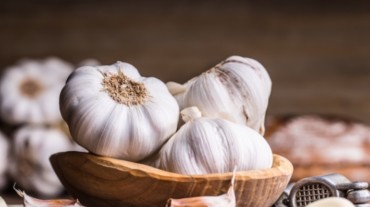
The la-la land of health is choked with myths ! From forwarded messages to Google searches, we believe everything that we read. And we don’t just stop at that! We propagate these ideas to everyone we know and that’s when this turns dangerous. This commonly happens, when it comes to Ayurvedic herbs. Do you know that Ayurvedic herbs are not for everyone?
Many of us go for herbal remedies to tackle health issues like depression, high blood pressure, etc. Yes, we know you consider them to be a safe deal, but that’s not always the case. According to nutritionist Manisha Chopra, these herbs can actually cause serious problems in people who are on heart medication.
Curious to know about these herbs? Take a look.
Garlic is known to lower the levels of cholesterol and blood pressure. It is used as a blood thinner, but its properties can increase the risk of bleeding, especially if you take it with other blood-thinning medication.

Saw palmetto is used to fight urinary problems that are caused by an enlarged prostate gland. It is also used to tackle hair fall, chronic pelvic pain, and reduced sex drive. Similar to garlic, it also increases the risk of bleeding, when taken with other blood-thinning medicines.
It is used to improve memory and prevent Alzheimer’s disease, asthma, sexual dysfunction, and leg pain caused by low circulation. Moreover, ginkgo increases the risk of bleeding, when ingested with other heart medications.
It boosts the immune system, and prevents cold and flu. It is also known to increase the risk of bleeding, when taken with other heart-related drugs.
It helps to reduce depression and anxiety, but at the same time, it affects the way the body absorbs the prescribed heart medication. It also increases the risk of bleeding with other drugs.
“Green tea is consumed to reduce mental alertness, to lose weight, and cholesterol. It may interfere with heart-related medication for irregular heart rhythms,” says Manisha.

It is used to lower cholesterol levels. Moreover, alfalfa increases the risk of bleeding, when taken with other heart-related drugs.
Select Topics of your interest and let us customize your feed.
PERSONALISE NOWIt improves various stomach problems like diarrhea, nausea, and stomachache. Ginger is also good for joint and muscle pain, and may interfere with blood clotting.
It is used to treat problems related to low circulation, diarrhea, skin problems, eyestrain, and menstrual cramps. It is risky to have it with blood thinners.
“It is used to boost energy, the immune system, and stamina. Ginseng is also used to lower blood pressure and cholesterol. If overused, it can diminish the effect of heart-related drugs.” warns Ms Manisha.
It is used to promote heart health and speed up weight loss. Moreover, grapefruit juice interferes with the absorption of heart-related drugs.
It is used to treat various problems like arthritis, diabetes, asthma, and many others. Regular use of aloe vera can drop the potassium levels in the body, which can result in heart rhythm problems.

“It is used to reduce the symptoms of menopause and in turn, treat joint and muscle pain. It may interfere with medication related to heart problems,” says Ms Chopra.
Also, read: A top cardiologist reveals why people get more heart attacks in winter
It is used to treat heart-related problems, but may negatively interact with heart-related medications.
It is used to treat ulcers and other stomach ailments, but can also interfere with heart medication.
So, STOP believing Ayurvedic hai to acha hai, because if you are a heart patient, it might backfire.